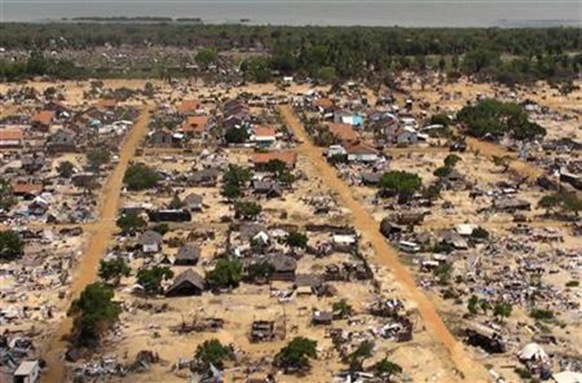 Sri Lanka came under mounting pressure from the United Nations and Western powers on Monday to ensure that perpetrators of atrocities committed in its long conflict that ended in 2009 are held to account.
Sri Lanka came under mounting pressure from the United Nations and Western powers on Monday to ensure that perpetrators of atrocities committed in its long conflict that ended in 2009 are held to account.
But Sri Lanka’s delegation staunchly defended the government of President Mahinda Rajapaksa saying it was working hard on national reconciliation and awaited a report by a national commission of inquiry on the war, due on November 15.
"It is critical to wait for that body to finish its deliberations and come up with its conclusions in due time," Mahinda Samarasinghe, Rajapaksa’s special envoy on human rights, told the U.N. Human Rights Council. The 47-member forum opened a three-week regular session to review abuses worldwide.
Amnesty International, in a report last week, said that the national inquiry has failed so far to investigate war crimes by both the army and Tamil rebels. It called on the United Nations to establish a credible international probe into what it said was the killing of 10,000-20,000 civilians in the final months of the 25-year civil war, many blamed on shelling by the army.
Sri Lanka says it was impossible to avoid all civilian casualties during a final offensive to wipe out the Tigers, who held nearly 300,000 people as human shields in the northeast, but says its troops used only necessary and lawful force.
Sri Lanka’s delegation held an informal session to present the government’s own film which it said revealed discrepancies in a "fake video" produced by Britain’s Channel 4 television purporting to show summary executions of Tamil prisoners by government soldiers.
The government film dismissed what it called "doctored footage and deliberate lies" contained in Channel 4’s film "Sri Lanka’s Killing Fields," contesting its claims that up to 40,000 were killed. It said that Channel 4 had ignored the Liberation Tigers of Tamil Eelam (LTTE) whom it called the "principle agent of deaths, displacement and destruction."
"We have won the war against terrorism, the objective has moved now to winning the peace," Samarasinghe said.
"CREDIBLE EVIDENCE"
Envoys from the European Union and United States welcomed the informal discussion but demanded accountability for massive violations of human rights and international humanitarian law.
"We continue to urge the government of Sri Lanka to quickly demonstrate that it is able and willing to meet these obligations as it seeks reconciliation. We hope the Sri Lankans will do this themselves but if they do not, there will be growing pressure from the international community to examine other options," U.S. ambassador Eileen Chamberlain Donahoe said.
Secretary-General Ban Ki-moon was poised on Monday to send a report by his advisory panel, which last April found "credible evidence" that government forces committed war crimes when crushing the Tigers, to the rights Council, U.N. officials said.
This could lead the EU to put the issue on the Council’s program of work, but no action was likely until next year, diplomats said. "The Sri Lankans think their frontal assault is going to work … But they have got to have some whiff of credibility or the international community will be forced to address it," a Western diplomat told Reuters.
Navi Pillay, U.N. High Commissioner for Human Rights, in a speech on Monday, said of Sri Lanka: "For three decades, not only has that country suffered the brutal effects of terrorist acts, but the response of successive governments over the years has undermined independent institutions, human rights and the rule of law."
She noted Rajapaksa’s decision "to allow some emergency measures to lapse" but she strongly urged his government to review all security-related legislation as well as detentions.
Samarasinghe said that out of some 11,600 ex-combatants, some 2,823 were still being rehabilitated, including 1,683 to be released "very shortly."
Mohan Peiris, now a senior cabinet advisor who was attorney-general until last week, said that the national inquiry was based on the theme of justice. "The mandate builds into it a very strong element of accountability," he said.
Peiris, asked whether it could be expected to recommend prosecutions, told Reuters: "I would have thought so — at least investigations."
The President of the Maldives, Mohamed Nasheed, called for finding an "amicable solution" in Sri Lanka, where he studied.
"We must understand that a number of very, very bad things happened but we must be able to move forward," he said.
(For updates you can share with your friends, follow TNN on Facebook and Twitter )
